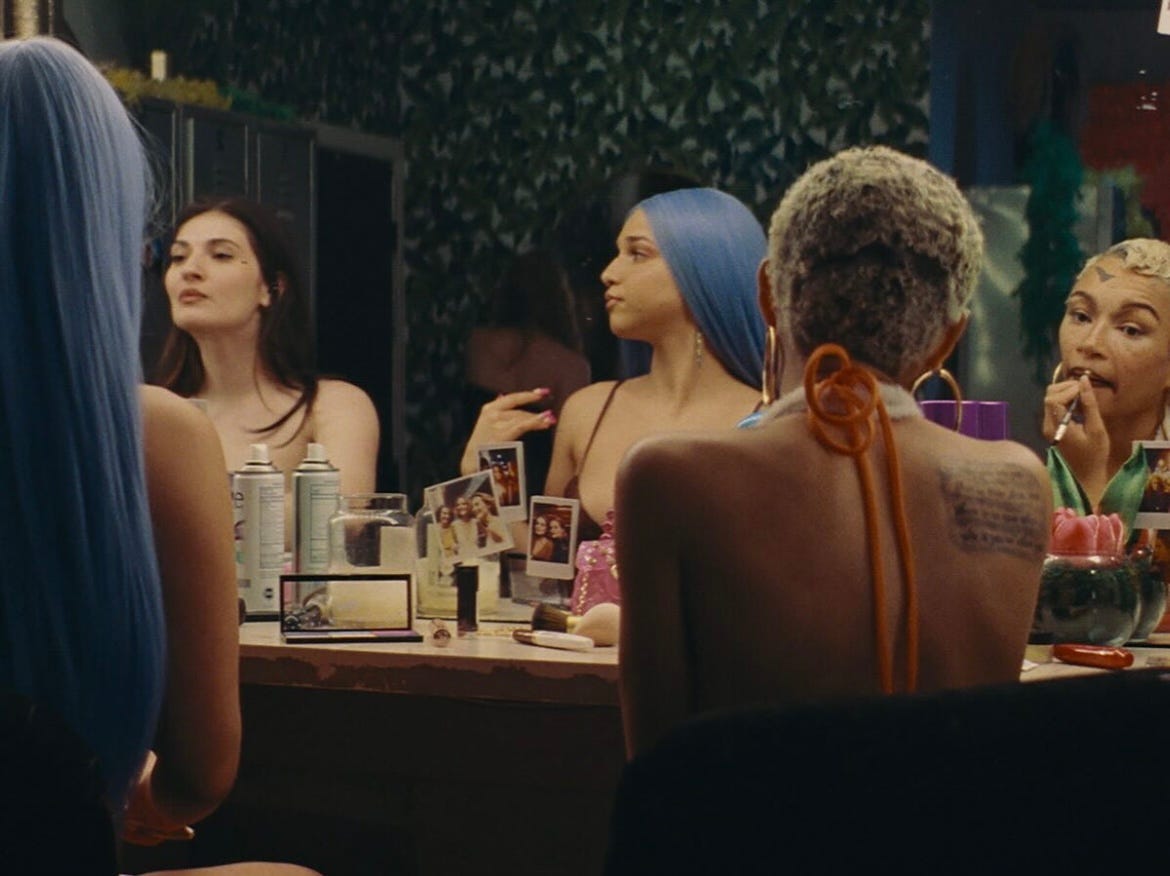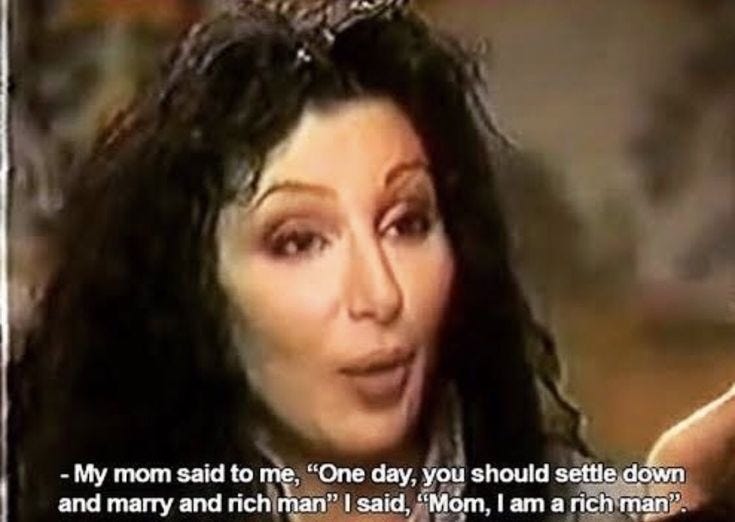Anora’s tragedy: When the wish to be taken care of is a wish you can’t afford
In a special guest post, Shanti Escalante-De Mattei unpacks what Sean Baker’s latest film can teach us about myths of womanhood and dependency
Watching Anora, Sean Baker’s latest film, I was struck by what good fortune looked like. It’s being taken care of, forever, in abundance. But what makes Anora shine is its modern retelling of the classic, gendered tragedy embedded in the wish of dependency.
Baker’s film opens with a shot that pans over girl, after girl, after girl, giving the anonymous man behind her a lap dance. Then we land on Anora (Mikey Madison), her tinseled hair spilling over her shoulders. We’re already in love. The camera follows her, and we witness the drudgery of her affective work as a stripper: Smiling, cajoling a guy to take out cash at the ATM, saying hello, getting rejected, on to the next guy. Eventually, she’s introduced to Ivan because she’s the only girl at the club that speaks Russian.
Ivan is a barely legal heir-to-oligarchs. But despite his seemingly infinite access to cash and the big, gauche mansion he lives in by himself, his tastes are that of any unimaginative teenage boy. He loves vape, partying, video game, and girls, basically behaving like a mini Wolf of Wall Street with absolutely zero responsibilities. But he’s not leery, inattentive, or plagued with a wandering eye; in fact, he’s kind of sweet. That being said, Ani makes it easy for him. Like we saw in the first shots of the movie, Ani leverages charm and suggestion in her favor, inspiring desire—and even better, affection—in the men she’s with.
After they hook up a couple of times (Energizer Bunny-style—he doesn’t know a thing about fucking beyond “I can come!”) he offers to buy a week of her company, instead of the usual hour. They end up in Vegas. Ani had just spent the last scenes being showered in champagne on the private jet, shopping for furs, watching Ivan bet it all on the casino floor. You can practically hear her purring. Perhaps this is what some might say it looks like when you are “resting in your feminine.”
The offer extends from a week to a lifetime. In the interest of staying in the country, he proposes to Ani. Ani’s face falls, her tone changes. “Don’t do that.” The proposal—even if it’s not for love, but for a Green Card—is too cruel to dangle it in her face. A wedding license, tied to the right, monied man, guarantees a life free from laboring, even if (especially if) they get divorced. But Ivan’s for real. The fantasy is fulfilled in a little white chapel, then consummated on the hotel bed.
We get one scene of what married life is like for the newlyweds. Back in Ivan’s mansion, Ani is lying in the crook of his arm as he plays video games in the cold winter light. One barely has time to wonder if she could really play the part of content wifey to a little boy for years before the plot rolls along into its next phase.
Ivan’s family has found out that he’s married to an escort. His handlers (three goons) are sent to deal with it. They arrive, Ivan escapes, Ani is trapped with these men who could be scary if they weren’t so stunningly incompetent (in fact, all of the men in this movie share that trait). With Ivan out of the picture, Ani snaps out of her happy trance into ferocious self-protection. She brings grown men to their knees (in pain, not in pleasure). She’s insulting, direct, and dangerous as she and the handlers spend the rest of a very long night looking for Ivan.
Ani thinks he’s run away to get help. The handlers, Toros and Garnik (brothers) and Igor (silent, sympathetic) assure her that this is not the case: He’s just run away. They finally do find Ivan back at the stripclub where he and Ani first met, wasted and getting a dance from her nemesis, a girl named Diamond.
It slowly dawns on Ani. While she was playing at being baby, he was actually baby. Women shift in and out of performances of competence because accessing care often means taking on the role of the dependent. It’s horrifying to learn that the person taking care of you isn’t playing too. He’s actually useless.
It ends badly for Ani. Or at least, not as she would’ve liked it to.
Women shift in and out of performances of competence because accessing care often means taking on the role of the dependent. It’s horrifying to learn that the person taking care of you isn’t playing too. He’s actually useless.
As a stripper-turned-tradwife, Anora straddles the line between two feminine archetypes that are increasingly at the forefront of our cultural conversation. Over the past few years the stripper has become an iconic figure, representing a set of nested issues: we understand that sex work is work, that men are trash but they have the money we need to survive, and that performing a certain kind of femininity is a way to access that capital.
While both figures trade a performance of femininity for capital (or care), the stripper is empowered because she plays the game instead of getting played. The tradwife has cleverly escaped the precarity of an unstable labor economy, and she too, is aware that there is a transaction taking place. In contrast, the housewife of the 1950s is often cast as a fool for believing the performance, buying into the idea that she is actually all those things that a performance of femininity demands of her: servile, vulnerable, in need of constant protection. But that’s the gag. Dependency—whether you’re aware that it’s structural, a result of a performance, or whatever else—is always a state of vulnerability. I understand that it’s not always a choice, or sometimes it’s the best choice available; that one can enter into a marriage where your role in the household is respected and valorized by your partner. My skepticism lies in the cultural shift that claims that being the wife to a rich man is the best thing that could possibly happen to you.
Dependency—whether you’re aware that it’s structural, a result of a performance, or whatever else—is always a state of vulnerability.
What Baker gets right isn’t just the different ways that competency and dependence figure into gendered performances, but the way class ties in. By the end of the film Ani has been a sex kitten and she has been a warrior and neither strategy is enough because she wasn’t born with the money that would’ve protected her. We get a hint of what is actually nutritious and generative in her budding romance with goon #3, Igor. He loves her strength and holds her in her collapse. It’s not mutually exclusive.
I worry that the current culture valorizes being a stay at home girlfriend as some kind of gotcha, get your bag business. But as the pendulum swings toward the tradwife, this has led to is a reification of the belief that we are built for this dependency, that consumption can equal care, that somehow we can be baby again, these ultimately powerful beings who are loved and pampered on the condition of their absolute vulnerability. Anora reminds us of a lesson our mothers and grandmothers and their mothers learned: being taken care of can be a raw deal. Associating our femininity with dependency is a risk because when we play the part of the dependent that’s what we become, and no amount of awareness really changes that. While we are all born vulnerable, we aren’t born incompetent—so let’s stop pretending.







Wow! This type of straight shooting journalism is not my usual read: but I have to admit,I enjoyed it. I’m an 83 year old woman who has been broken by my mother, my family of origin, and various men. But I am here to say that looking to be cared for is not only overrated but a complete waste of time. The story of Anora is definitely a tragedy. Firstly you can’t be afraid of hard work, yourself or others. Just keep on trucking!
Great review, very thought provoking!
To have a relationship is to depend on someone, there is no escaping it.
I have not seen the movie, but from what I understand of the plot, my takeaway is that successful relationships are based in equality, which includes equal dependence.
Anora discovering her benefactor-husband back in the strip club merely illustrates that he does not depend on her for anything meaningful. A more successful relationship with similar income equality would have to be founded on shared goals, shared values, and mature parties who understand that they depend on each other for both pragmatic and emotional reasons.
Anora has made a mistake in consenting to marry him, but she is also deserving of pity. She is very vulnerable at the time of his proposal: there is new relationship energy, the pressures of his socioeconomic status, they are far away from her home and support structures (which she may not have as she is a stripper). He is definitely taking advantage of her for his own purposes, which is not the foundation of any successful relationship.
That to me is more the underlying problem. The asymmetric dependency is the symptom, not the cause.
A proper relationship involves two individuals moving progressively into greater mutual dependence in relatively equal measure.